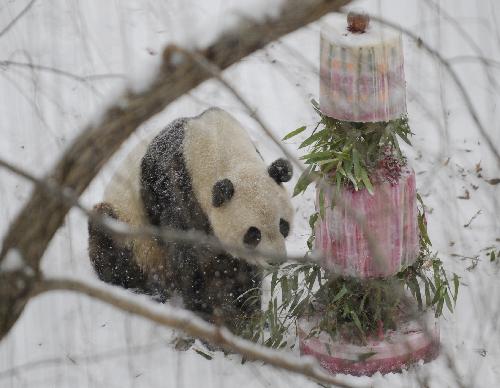2 giant pandas in U.S. to return to China
Two giant pandas in the United States will fly back home in the southwestern Chinese province of Sichuan next week, according to local officials.
|
|
|
Giant panda Tai Shan enjoys a cake during a farewell party at the National Zoo in Washington D.C., the United States, Jan. 30, 2010. Hundreds of fans braved heavy snowfall Saturday to express goodbye to Tai Shan. |
Tai Shan, a 4-and-a-half-year-old male panda born at the National Zoo of Washington D.C., and Mei Lan, a 3-year-old female panda born at Zoo Atlanta, will arrive in Chengdu Feb. 5 after a 14-hour journey from Washington.
Experts from the two zoos will escort the two giant pandas back to China.
Tai Shan, who was born in July 2005 and raised up in the National Zoo, will return to the Ya'an Bifeng Gorge Breeding Base of Wolong National Nature Reserve.
Tai Shan was supposed to get back to China at the age of two. The Chinese government agreed to postpone its return twice in 2007 and 2009 at the request of the National Zoo, where millions of people visited him.
Tai Shan's father Tian Tian, 13, and mother Mei Xiang, 12, are also due to return December next year.
Mei Lan will return to the Chengdu Research Base of Giant Panda Breeding.
Mei Lan was born in September 2006. Her parents Lun Lun and Yang Yang arrived in Atlanta in November 1999.
There are now 13 Chinese giant pandas living in four zoos in the United States.
Giant pandas, known for being sexually inactive, are among the world's most endangered animals.
There are about 1,600 giant pandas living in China's wild, mostly in Sichuan and the northwestern provinces of Shaanxi and Gansu. Another 290 are in captive-breeding programs worldwide, mainly in China.
 0
0 







